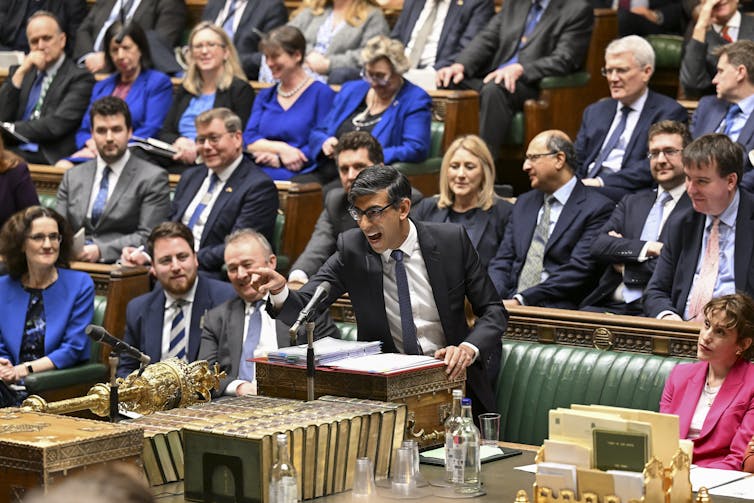The first televised debate of the 2024 general election took place on Tuesday, June 4, putting Rishi Sunak and Keir Starmer head to head on ITV. ITV has also announced they will hold a multiparty debate later in June. The BBC will host at least two multiparty debates, as well as the last Sunak-Starmer face-off before polling day.
If voters are hoping to hear party leaders respond spontaneously and authentically to questions, they’re likely to be disappointed. For those who tune in (6.7 million in 2019, down from 10.3 million in 2010), it is not necessarily because they expect to learn anything new about the candidates or their policies. Rather, they are likely intrigued by the spectacle of adversarial conflict.
The parties know this. Sunak’s enthusiasm for having a debate every week of the campaign is probably less to do with any benefit he expects to gain from putting his case to the public than a desire to maximise the opportunities for Starmer to make some kind of gaffe. He can also use the knowledge that Starmer will say no to paint the Labour leader as scared of confrontation.
YouGov data suggests that those who voted Labour in 2019 are almost twice as likely as Conservative voters to be very interested in watching the debates. Given the current polling, this perhaps reflects the expected enjoyment of seeing their side win.

Want more election coverage from The Conversation’s academic experts? Over the coming weeks, we’ll bring you informed analysis of developments in the campaign and we’ll fact check the claims being made.
Sign up for our new, weekly election newsletter, delivered every Friday throughout the campaign and beyond.
Do debates influence how people vote?
Research generally finds that debates, as with other election coverage, have very little impact on those with a firm party preference, and only slightly more on floating and undecided voters.
But YouGov’s polling indicates that almost half of voters expect the debates to have at least a “fair amount” of influence on the result. Here, we should remember the phenomenon known as the third-person effect: we often expect others to be more susceptible to media influence than ourselves.
The perception that debates influence voting outcomes may also be tied, as YouGov’s analysis suggests, to “Cleggmania” – the well-received performance of relatively unknown Liberal Democrat leader Nick Clegg in the first televised debates in 2010. This, however, did not translate to the ballot box. Although the Lib Dem share of the vote rose by 1%, the party won five fewer seats than in 2005.
Throughout the debate, then prime minister Gordon Brown recognised common ground with Clegg: “I agree with Nick.” The press interpreted this as evidence of Brown’s weakness and a Lib Dem resurgence. This narrative may have encouraged those leaning towards the Lib Dems to vote for them, on the basis that rising support meant it was less likely to be a “wasted” vote.
While it did not help the party much on election day, it does provide another lesson about debate performance. Brown’s “agreeing with Nick” showed an aspect of constructive politics that voters have expressed a desire to see more of in debates.
What do voters want?
Research in the UK and elsewhere in Europe has shown that viewers are very aware of (and frustrated by) politicians’ tendency to dodge questions and give rehearsed answers during debates. We know that voters tend to feel alienated by this, and see debates as “a lot of going round in circles”.
This is where moderators could have more of a role to play. Participants in audience research have suggested that moderators should interfere more when debaters use straw man arguments, and encourage more constructive agreement and disagreement: “They should ask debaters to recognise points of agreement and openings for collaboration or compromise, without expecting consensus.”
Moderating a live political debate in front of an audience is a difficult thing to do. ITV’s Julie Etchingham will have enough of a challenge in keeping Sunak and Starmer on topic and on time on Tuesday.
Debates are most influential when it comes to personal impressions of the candidates’ character, rather than their policies. Unlike the popular media personalities who have made celebrity politicians in recent years, both Sunak and Starmer are wonkish politicians whose strengths lie in appearing competent rather than especially likeable.
Voters will already have seen Sunak and Starmer butt heads in prime minister’s questions. Such adversarial battles are not well suited to generating positive impressions from the debate stage. The Conservative party discovered this when they decided to cancel the final debate for their party leadership election in 2022 amid concern that the bruising clashes could damage the party’s image as a whole.

In the social media age, debates and interviews can be especially dangerous paths, where a single meme-able gaffe, slip-up or unflattering insight (Theresa May’s running through fields of wheat, for example) can undermine the credibility of a leader. Starmer may be tempted to a defensive and controlled campaign that avoids opportunities for such moments – but that too, as May found in 2017 when she ditched the debates, can be dangerous.
In whatever debates materialise in the coming weeks, we can enjoy the drama, share notes (or memes) on Sunak and Starmer’s best and worst moments, and roll our eyes at the already well-rehearsed soundbites. But for a democratically useful discussion of the relative merits of the policy agendas, we should probably look elsewhere.

